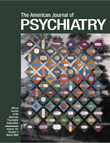To the Editor: The article by Carlos Blanco, M.D., Ph.D., and colleagues
(1) drew attention to the lack of a coherent mental health policy in the United States. The results of this study indicated that international medical graduates work more frequently in the public sector and treat a higher proportion of patients with psychotic disorders. Psychiatrists with international medical degrees also treat more African American, Hispanic, and other minority patients. However, a lower percentage of psychiatrists with international medical degrees have board certification. One reason, according to Dr. Blanco et al.
(1), might be poorer training. Yet government and organized medicine are trying to decrease the number of international medical graduates in the United States. Thus, the mental health field faces several paradoxes, some of them underscored by the results of Dr. Blanco and colleagues’ report
(1).
1. More severely mentally ill patients are treated by psychiatrists who are discriminated against
(2) and have possibly poorer training and whose numbers the United States is attempting to limit.
2. The percentage of minority patients is increasing, yet there is an attempt to limit the numbers of psychiatrists who are more likely to provide care for them.
3. The percentage of the elderly population is increasing, yet there is an effort to limit the numbers of psychiatrists who spend more time working with elderly people.
4. The number of medical students interested in psychiatry continues to decline
(3), yet we are trying to limit the number of international medical graduates who have helped us save our profession from rapidly dwindling. About 850 new psychiatrists per year are needed to maintain the status quo. However, only about 430 U.S. medical students per year select psychiatry as their specialty.
5. For years we have heard of a supposed surplus of psychiatrists; thus the number of residency positions in psychiatry has been going down. Yet unemployment among graduates of psychiatry residencies is very low, and the numbers of others in the mental health professions (e.g., psychologists and social workers) are rapidly growing.
It is time to seriously reevaluate our mental health policy regarding severely mentally ill and minority patients and the number of international medical graduates in U.S. psychiatric practice. We may be keeping the number of psychiatrists, especially that of international medical graduates, artificially low, thus effectively discriminating against severely mentally ill individuals and minorities. It is obvious that APA should strongly campaign against any efforts to limit the number of able international graduates from entering the field of psychiatry. The results of Dr. Blanco et al.’s report (1) strongly support this notion.

